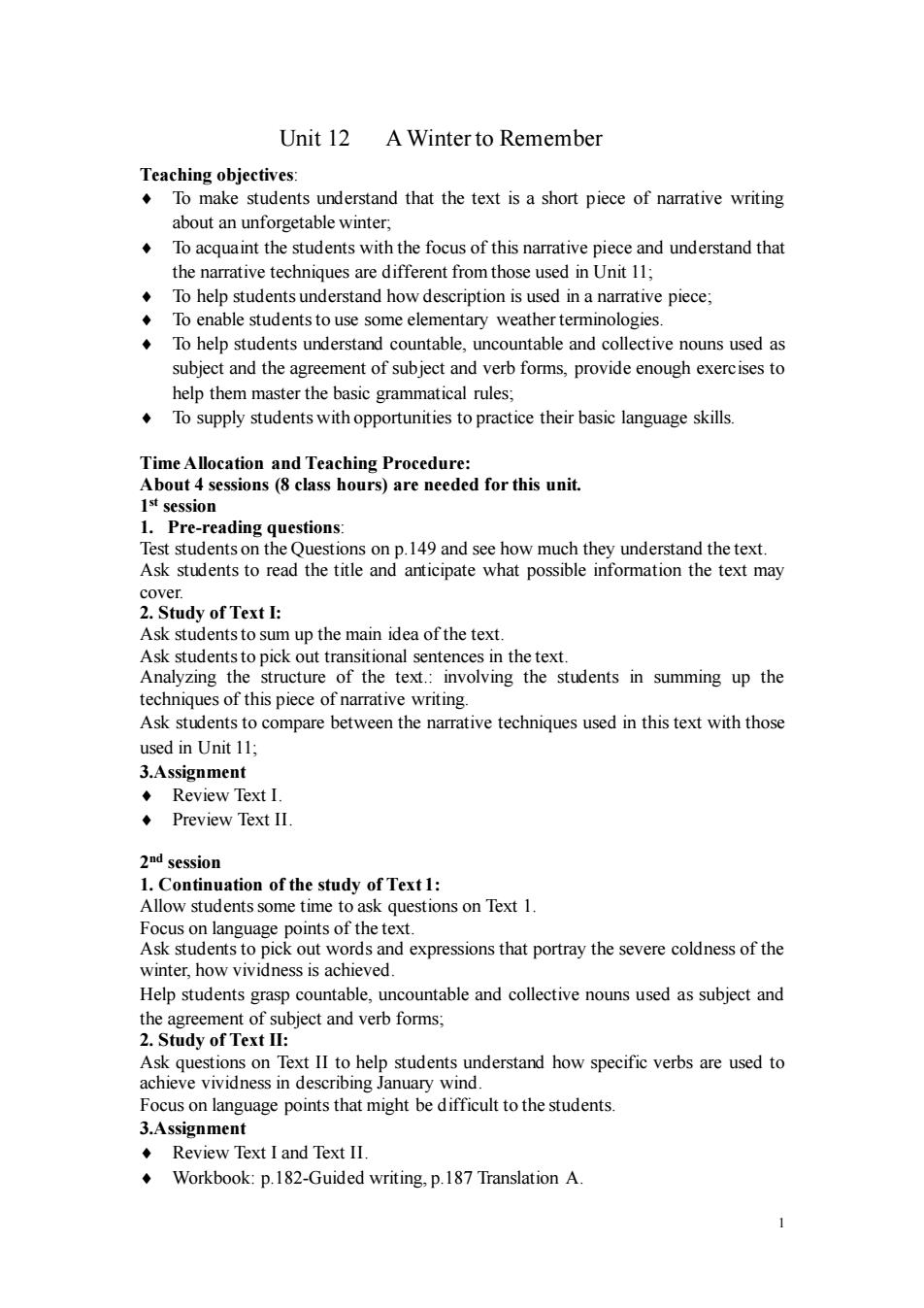
Unit 12 A Winter to Remember Teaching objectives: To make students understand that the text is a short piece of narrative writing about an unforgetable winter. To acquaint the students with the focus of this narrative piece and understand that rative techniques are differ ent from those used in Unit 1. To help sunderstand how description is u sed in a narrative piece: To enable students to use some elementary weather terminologies To help students understand countable.uncountable and collective nouns used as subject and the agreement of subject and verb forms,provide enough exercises to help them master the basic grammatical rules To supply students with opportunities topractice their basic language skills Tim out 4 din stions Tast studen ons on p 149 and see how much they anderstand the text Ask students to read the title and anticipate what po ssible info ation the text may 2.Study of Text I: Ask students to sum up the main idea of the text. Ask students to pick out transitional sentences in the text. Analyzing the structure of the text.:involving the students in summing up the techniques of this piece of narrative writing. Ask students to compare between the narrative techniques used in this text with those used in Unit 11: 3.Assignmen Review Text ◆Preview Text II e stu s some tir questions on Text 1 expressions that portray the severe coldness of the eved Help students grasp countable,uncountable and collective nouns used as subject and the agreement of bject and verb forms; 2.Study of Text I Ask que t II to hel students understand how specific verbs are used to us on language points that might be difficult to the students 3.Assignment Review Text I and Text II. Workbook:p.182-Guided writing,p.187 Translation A
1 Unit 12 A Winter to Remember Teaching objectives: To make students understand that the text is a short piece of narrative writing about an unforgetable winter; To acquaint the students with the focus of this narrative piece and understand that the narrative techniques are different from those used in Unit 11; To help students understand how description is used in a narrative piece; To enable students to use some elementary weather terminologies. To help students understand countable, uncountable and collective nouns used as subject and the agreement of subject and verb forms, provide enough exercises to help them master the basic grammatical rules; To supply students with opportunities to practice their basic language skills. Time Allocation and Teaching Procedure: About 4 sessions (8 class hours) are needed for this unit. 1 st session 1. Pre-reading questions: Test students on the Questions on p.149 and see how much they understand the text. Ask students to read the title and anticipate what possible information the text may cover. 2. Study of Text I: Ask students to sum up the main idea of the text. Ask students to pick out transitional sentences in the text. Analyzing the structure of the text.: involving the students in summing up the techniques of this piece of narrative writing. Ask students to compare between the narrative techniques used in this text with those used in Unit 11; 3.Assignment Review Text I. Preview Text II. 2 nd session 1. Continuation of the study of Text 1: Allow students some time to ask questions on Text 1. Focus on language points of the text. Ask students to pick out words and expressions that portray the severe coldness of the winter, how vividness is achieved. Help students grasp countable, uncountable and collective nouns used as subject and the agreement of subject and verb forms; 2. Study of Text II: Ask questions on Text II to help students understand how specific verbs are used to achieve vividness in describing January wind. Focus on language points that might be difficult to the students. 3.Assignment Review Text I and Text II. Workbook: p.182-Guided writing, p.187 Translation A
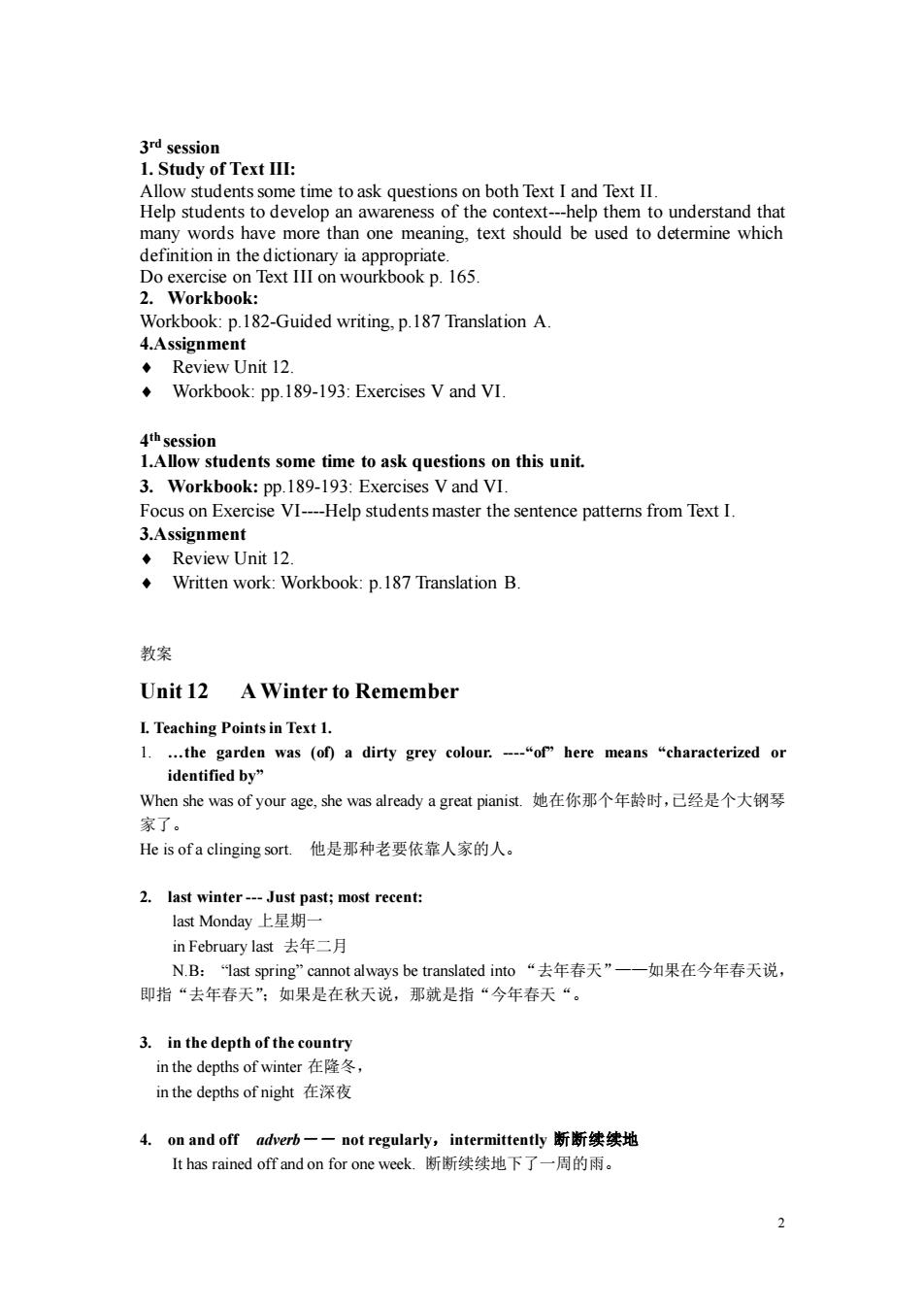
3rd session 1.Study of Text III: Allow students some time to ask questions on both Text i and Text il Help students to develop an awareness of the context-help them to understand that many words have more than one meaning,text should be used to determine which definition in the dictionary ia appropriate. Do exercise on Text III on wourkbook p.165. 2.Workbook: Workbook:p.182-Guided writing,p.187 Translation A. 4.Assignment ◆Review Unit 12. Workbook:pp.189-193:Exercises V and VI. densome time toask qustionn 3.Workbook:pp.189-193:Exercises V and VI. Focus on Exercise VI-Help students master the sentence patterns from Text I. 3.Assignment Review Unit 12 Written work:Workbook:p.187 Translation B. 教案 Unit12 A Winter to Remember L Teaching Pointsin Text 1 1.the garden was (of)a dirty grey colour.-"of here means "characterized or identified by" When she was of your age,.she was already a great pianist.她在你那个年龄时,已经是个大钢琴 家了。 He is of a clinging sort.他是那种老要依靠人家的人 2.last winter-Just past;most recent: last Monday上星期 in February last去年二月 N B. always be translated into“去年春天” 一如果在今年春天说 3.in the depth of the country in the depths of winter在降冬 inthe depths of night在深夜 4.on and off adverb一一not regularly,intermittently断断线续地 It has rained off and on for one week.断断续续地下了一周的雨
2 3 rd session 1. Study of Text III: Allow students some time to ask questions on both Text I and Text II. Help students to develop an awareness of the context-help them to understand that many words have more than one meaning, text should be used to determine which definition in the dictionary ia appropriate. Do exercise on Text III on wourkbook p. 165. 2. Workbook: Workbook: p.182-Guided writing, p.187 Translation A. 4.Assignment Review Unit 12. Workbook: pp.189-193: Exercises V and VI. 4 th session 1.Allow students some time to ask questions on this unit. 3. Workbook: pp.189-193: Exercises V and VI. Focus on Exercise VI-Help students master the sentence patterns from Text I. 3.Assignment Review Unit 12. Written work: Workbook: p.187 Translation B. 教案 Unit 12 A Winter to Remember I. Teaching Points in Text 1. 1. .the garden was (of) a dirty grey colour. -“of” here means “characterized or identified by” When she was of your age, she was already a great pianist. 她在你那个年龄时,已经是个大钢琴 家了。 He is of a clinging sort. 他是那种老要依靠人家的人。 2. last winter - Just past; most recent: last Monday 上星期一 in February last 去年二月 N.B: “last spring” cannot always be translated into “去年春天”——如果在今年春天说, 即指“去年春天”;如果是在秋天说,那就是指“今年春天“。 3. in the depth of the country in the depths of winter 在隆冬, in the depths of night 在深夜 4. on and off adverb―― not regularly,intermittently 断断续续地 It has rained off and on for one week. 断断续续地下了一周的雨
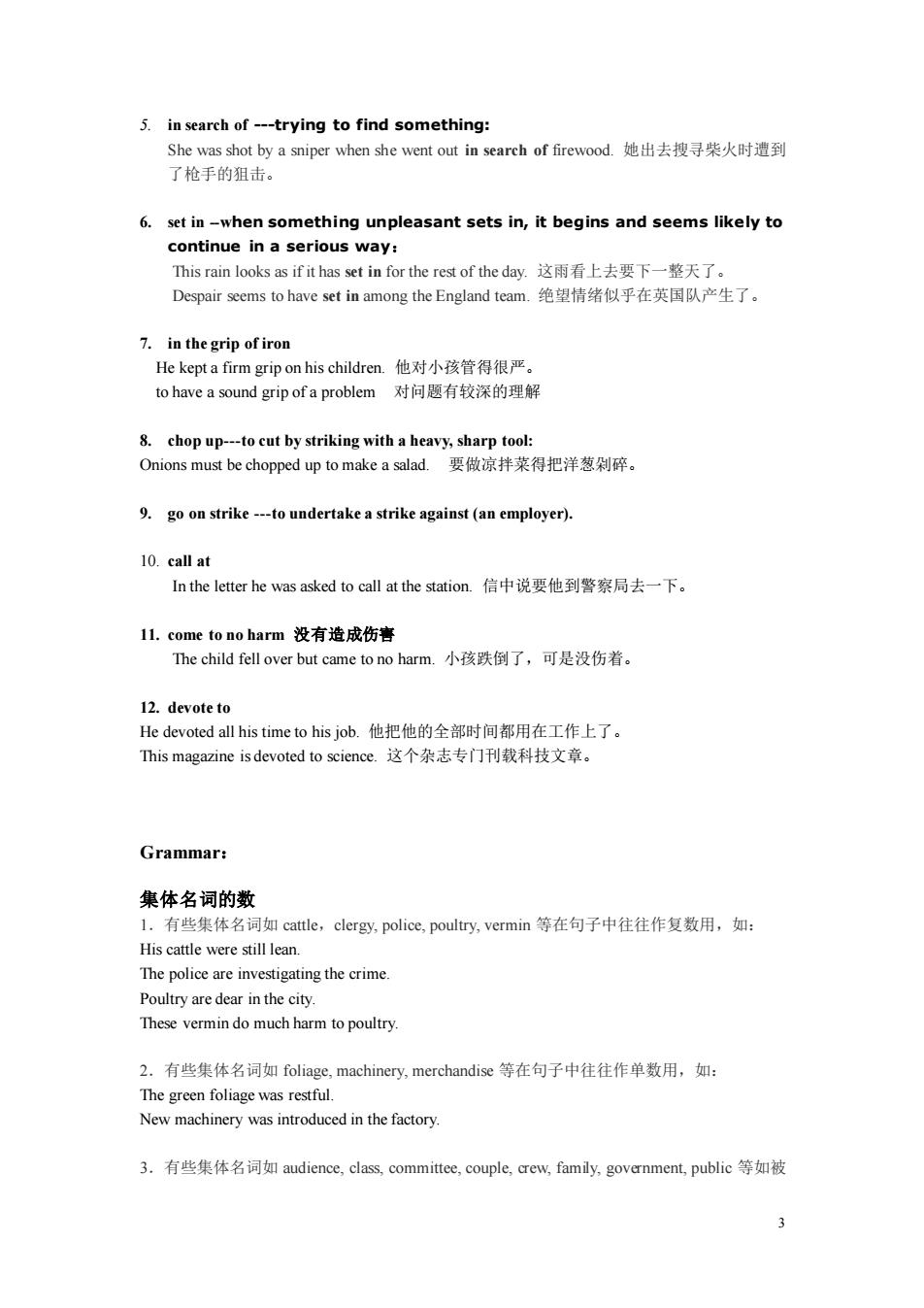
5.in search of-trying to find something: She was shot by a sniper when she went out in search of firewood.她出去搜寻柴火时遭到 了枪手的狙击。 6.set in-when something unpleasant sets in,it begins and seems likely to continue in a serious way: This rain looks as if it hasse for the rest of the day.这雨看上去要下一整天了。 Despair seems to have set in among the England team.绝望情绪似乎在英国队产生了。 7.in the grip ofiron He kept a firm grip on his children.他对小孩管得很严。 to have a sound grip of a problem对问题有较深的理解 chop up-to cut by striking with a heavy,sharp tool Onions must be chopped up tomake a salad.要做凉拌菜得把洋葱剁醉。 9.go on striketoundertake a strike against(an employer). 10.call at In the letter he was asked to call at the station.信中说要他到警察局去一下 1L.come to no harm没有造成伤害 The child fell over but came to no harm.小孩跌倒了,可是没伤着。 12.devote to He devoted all his time to his job.他把他的全部时间都用在工作上了。 This magazine is devoted to science.这个杂志专门刊载科技文章。 Grammar: 集体名词的数 1.有些集体名词如cattle,clergy,.police,poultry,vermin等在句子中往往作复数用,如: were still lear The police are investigating the crime. Poultry are dear in the city. These vermin do much harm to poultry 2.有些集体名词如foliage,machinery,merchandise等在句子中往往作单数用,如: The green foliage was restfu New machinery was introduced in the factory 3.有些集体名词如1audience,.class,.committee,couple,crew,family,government,public等如被 3
3 5. in search of -trying to find something: She was shot by a sniper when she went out in search of firewood. 她出去搜寻柴火时遭到 了枪手的狙击。 6. set in -when something unpleasant sets in, it begins and seems like ly to continue in a serious way: This rain looks as if it has set in for the rest of the day. 这雨看上去要下一整天了。 Despair seems to have set in among the England team. 绝望情绪似乎在英国队产生了。 7. in the grip of iron He kept a firm grip on his children. 他对小孩管得很严。 to have a sound grip of a problem 对问题有较深的理解 8. chop up-to cut by striking with a heavy, sharp tool: Onions must be chopped up to make a salad. 要做凉拌菜得把洋葱剁碎。 9. go on strike -to undertake a strike against (an employer). 10. call at In the letter he was asked to call at the station. 信中说要他到警察局去一下。 11. come to no harm 没有造成伤害 The child fell over but came to no harm. 小孩跌倒了,可是没伤着。 12. devote to He devoted all his time to his job. 他把他的全部时间都用在工作上了。 This magazine is devoted to science. 这个杂志专门刊载科技文章。 Grammar: 集体名词的数 1.有些集体名词如 cattle,clergy, police, poultry, vermin 等在句子中往往作复数用,如: His cattle were still lean. The police are investigating the crime. Poultry are dear in the city. These vermin do much harm to poultry. 2.有些集体名词如 foliage, machinery, merchandise 等在句子中往往作单数用,如: The green foliage was restful. New machinery was introduced in the factory. 3.有些集体名词如 audience, class, committee, couple, crew, family, government, public 等如被
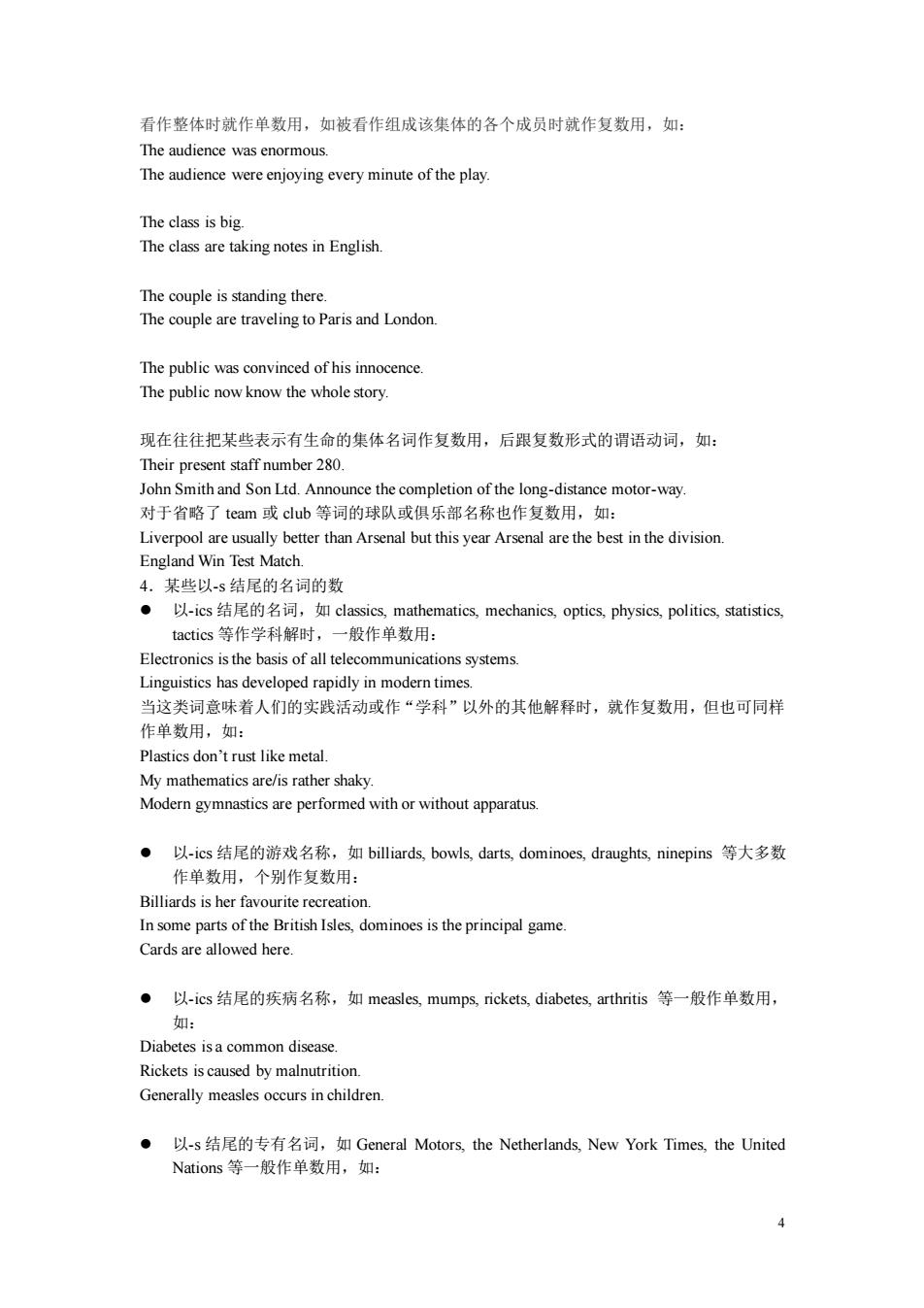
看作整体时就作单数用,如被看作组成该集体的各个成员时就作复数用,如: The audience was enormous. The audience were enjoying every minute of the play The class is big. The class are taking notes in English The coupe is standing there The couple are traveling to Paris and London. The publie was convinced of his innocence. The public now know the whole story 现在往往把某些表示有生命的集体名词作复数用,后跟复数形式的谓语动词,如: Their present staff number 280. John Smith and Son Ltd.Announce the completion of the long-distance motor-way. 对于省略了team或cub等词的球队或俱乐部名称也作复数用,如: are etter than Arsenal but this year Arsenal are the best in the division England Win Test Mate 4,某些以s结尾的名词的数 ·以-ics结尾的名词,如classics,.mathematics,mechanics,opties,.physics,.politics,statistics, tactics等作学科解时,一般作单数用: Electronics is the basis of all te ons systems eloped rapidly in m nodern times 当这类词意味着人们的实践活动或作“学科”以外的其他解释时,就作复数用,但也可同样 作单数用,如: Plastics don't rust like metal My mathematics are/is rather shaky Modern gymnastic s are performed with or without apparatus ·以-ics结尾的游戏名称,如billiards,bowls,darts,dominoes,.draughts,ninepins等大多数 作单数用,个别作复数用: Billiards is her favourite recreation Insome parts of the British Isles,dominoes is the principal game Cards are allowed here. ·以-ics结尾的疾病名称,如measles,mumps,rickets,diabetes,arthritis等一般作单数用, 如, Diabetes isa common disease Rickets Generally measles occurs in children ·以-s结尾的专有名词,如General Motors,.the Netherlands,New York Times,the United Nations等一般作单数用,如: 4
4 看作整体时就作单数用,如被看作组成该集体的各个成员时就作复数用,如: The audience was enormous. The audience were enjoying every minute of the play. The class is big. The class are taking notes in English. The couple is standing there. The couple are traveling to Paris and London. The public was convinced of his innocence. The public now know the whole story. 现在往往把某些表示有生命的集体名词作复数用,后跟复数形式的谓语动词,如: Their present staff number 280. John Smith and Son Ltd. Announce the completion of the long-distance motor-way. 对于省略了 team 或 club 等词的球队或俱乐部名称也作复数用,如: Liverpool are usually better than Arsenal but this year Arsenal are the best in the division. England Win Test Match. 4.某些以-s 结尾的名词的数 ⚫ 以-ics 结尾的名词,如 classics, mathematics, mechanics, optics, physics, politics, statistics, tactics 等作学科解时,一般作单数用: Electronics is the basis of all telecommunications systems. Linguistics has developed rapidly in modern times. 当这类词意味着人们的实践活动或作“学科”以外的其他解释时,就作复数用,但也可同样 作单数用,如: Plastics don’t rust like metal. My mathematics are/is rather shaky. Modern gymnastics are performed with or without apparatus. ⚫ 以-ics 结尾的游戏名称,如 billiards, bowls, darts, dominoes, draughts, ninepins 等大多数 作单数用,个别作复数用: Billiards is her favourite recreation. In some parts of the British Isles, dominoes is the principal game. Cards are allowed here. ⚫ 以-ics 结尾的疾病名称,如 measles, mumps, rickets, diabetes, arthritis 等一般作单数用, 如: Diabetes is a common disease. Rickets is caused by malnutrition. Generally measles occurs in children. ⚫ 以-s 结尾的专有名词,如 General Motors, the Netherlands, New York Times, the United Nations 等一般作单数用,如:
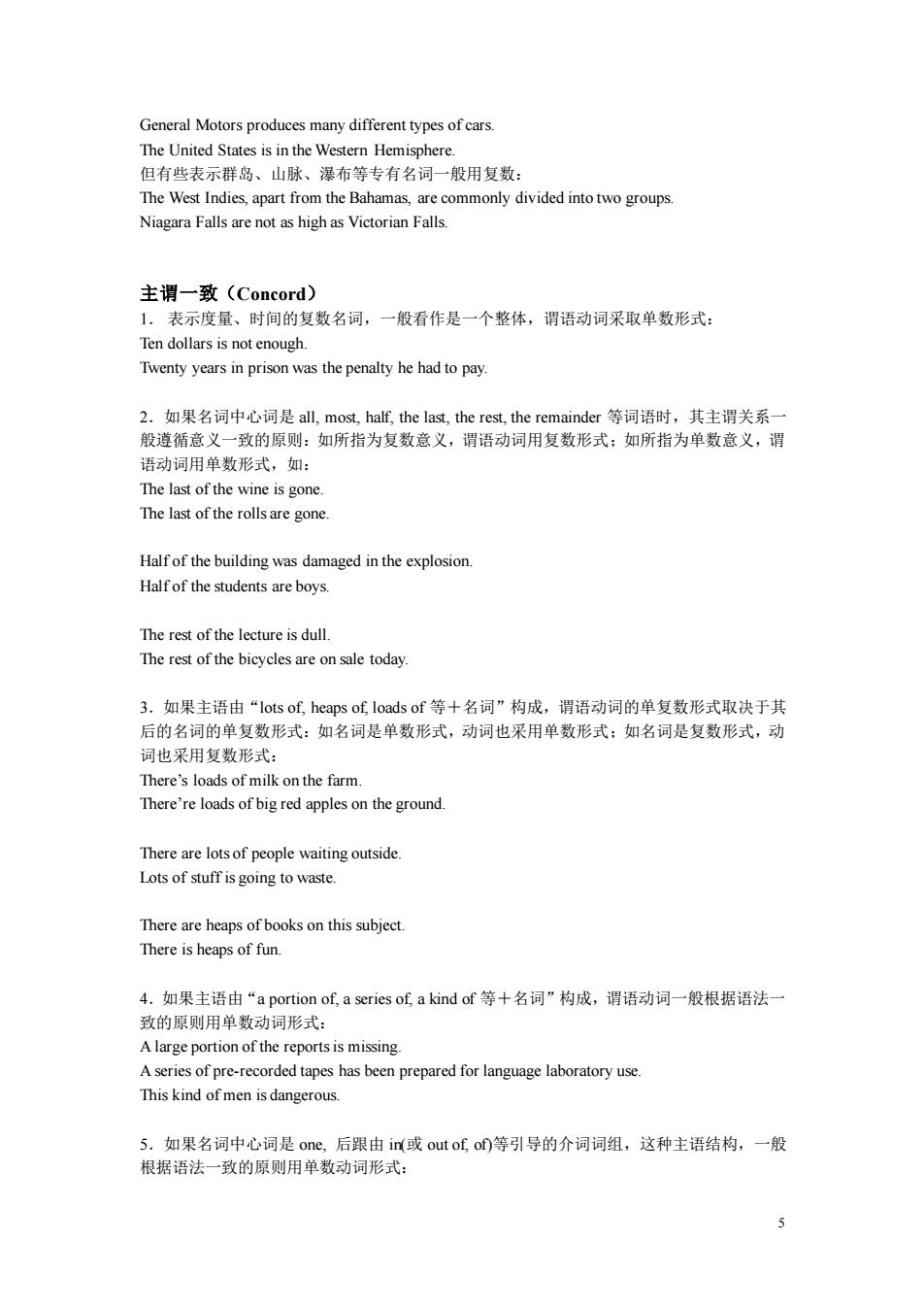
General Motors produces many different types of cars. The united states is in the western Hemis 但有些 示群岛、 山脉、瀑布等专有名词 一般用复数 The West Indies,apart from the Bahamas,are commonly divided into two groups. Niagara Falls are not as high as Victorian Falls. 主谓一致(Concord) 1.表示度量、时间的复数名词,一般看作是一个整体,谓语动词采取单数形式 Ten dollars is not enough. Twenty years in prison was the penalty he had to pay mo half,the last,the rest ainder等词语时,其主谓关系 致的原则:如所指为复数意义,谓语动词用复数形式:如所指为单数意义,谓 语动词用单数形式,如: The last of the wine is gone The last of the rolls are gone Half of the building was damaged in the explosion Halfof the students are boys. The rest of the lecture is dull The rest of the bicycles are onsae today 3.如果主语出 “lotsof,.heaps of loadsof等+名词”构成,谓语动词的单复数形式取决于其 后的名词的单复数形式:如名词是单数形式,动词也采用单数形式:如名词是复数形式,动 词也采用复数形式: There's loads of milk on the farm. There're loads of big red apples on the ground. There are lots of people waiting outside. Lots of stuff is going to waste. There are heaps of books on this subject. There is heaps of fun. 4.如果主语由“a portion of,a series ofa kind of等+名词”构成,谓语动词一般根据语法一 致的原则用单数动词形式: Alarge portion of the reports is missing A se fpre recorde d tapes has be een prepared for language laboratory use This kind of men is dangerous 5.如果名词中心词是one,后跟由in(或out of,o)等引导的介词词组,这种主语结构,一般 根据语法一致的原则用单数动词形式: 5
5 General Motors produces many different types of cars. The United States is in the Western Hemisphere. 但有些表示群岛、山脉、瀑布等专有名词一般用复数: The West Indies, apart from the Bahamas, are commonly divided into two groups. Niagara Falls are not as high as Victorian Falls. 主谓一致(Concord) 1. 表示度量、时间的复数名词,一般看作是一个整体,谓语动词采取单数形式: Ten dollars is not enough. Twenty years in prison was the penalty he had to pay. 2.如果名词中心词是 all, most, half, the last, the rest, the remainder 等词语时,其主谓关系一 般遵循意义一致的原则:如所指为复数意义,谓语动词用复数形式;如所指为单数意义,谓 语动词用单数形式,如: The last of the wine is gone. The last of the rolls are gone. Half of the building was damaged in the explosion. Half of the students are boys. The rest of the lecture is dull. The rest of the bicycles are on sale today. 3.如果主语由“lots of, heaps of, loads of 等+名词”构成,谓语动词的单复数形式取决于其 后的名词的单复数形式:如名词是单数形式,动词也采用单数形式;如名词是复数形式,动 词也采用复数形式: There’s loads of milk on the farm. There’re loads of big red apples on the ground. There are lots of people waiting outside. Lots of stuff is going to waste. There are heaps of books on this subject. There is heaps of fun. 4.如果主语由“a portion of, a series of, a kind of 等+名词”构成,谓语动词一般根据语法一 致的原则用单数动词形式: A large portion of the reports is missing. A series of pre-recorded tapes has been prepared for language laboratory use. This kind of men is dangerous. 5.如果名词中心词是 one, 后跟由 in(或 out of, of)等引导的介词词组,这种主语结构,一般 根据语法一致的原则用单数动词形式:

One out of ten was badly damaged. 但在非正式文体中,常根据就近原则,把她看成复数,跟复数动词: Only one out of five were present It is estimated that one in every three people there smoke cigarettes. 6.如果主语由more than one.,many a.构成,尽管意义上看是复数内容,单谓语动词仍 然采用单数形式: There is more than one answer to your question. Many a man has sacrificed his life for the cause ofthe revolution. 但是,如more than one后面没有名词,谓语动词即可单数,也可复数,这取决于more和one 两个词中哪个是重读: More than one is going.(one重i读) ‘More than one is going(more重读) 6
6 One out of ten was badly damaged. 但在非正式文体中,常根据就近原则,把她看成复数,跟复数动词: Only one out of five were present. It is estimated that one in every three people there smoke cigarettes. 6.如果主语由 more than one.,many a.构成,尽管意义上看是复数内容,单谓语动词仍 然采用单数形式: There is more than one answer to your question. Many a man has sacrificed his life for the cause of the revolution. 但是,如 more than one 后面没有名词,谓语动词即可单数,也可复数,这取决于 more 和 one 两个词中哪个是重读: More than ‘one is going. (one 重读) ‘More than one is going. (more 重读)